Belgian Prime Minister Alexander De Croo and Minister of Foreign Affairs Hadja Lahbib are set to visit China this week, marking the first high-level mission since 2019.
Lahbib touches down in Shanghai on Tuesday and will focus her efforts on fostering economic connections. She will join De Croo in Beijing on Thursday for official engagements with President Xi Jinping, Prime Minister Li Qiang, and Zhao Leji, the Chairman of the National People’s Congress.
Key to discussions will be all aspects of Sino-Belgian relationships, according to late-December statements from De Croo’s office.
It is the first visit to China by a Belgian PM since 2016. In 2015, the King led a state visit accompanied by serving ministers, diplomats, and several companies. After low-level contact during the emergence of the Covid-19 pandemic in Wuhan, this mission offers renewed interaction and high-level re-engagement opportunities.
In recent years, however, the West's relationship with China has significantly shifted. China’s soft power approach has evolved into a policy perceived by Western nations as being decidedly more aggressive. Issues such as Taiwan, ongoing conflicts in the South China Sea and trade relationships have all contributed to rising tensions between Belgium and China.
Furthermore, NGOs have urged the Belgian Government to raise the topic of Tibet with Chinese officials during the trip.
“Our relationship with China hinges on three components, much like the European Union. China is simultaneously a partner, competitor, and a rival. Means we must navigate areas of collaboration and maintain vigilance,” De Croo explained last month, mirroring EU policy.

Belgian Foreign Minister Hadja Lahbib and Prime Minister Alexander De Croo talk to the press during the 78th session of the United Nations General Assembly (UNGA78), in New York City, United States of America, Thursday 21 September 2023. Credit: Belga / Benoit Doppagne
The Belgian PM made these comments while answering a flurry of questions regarding a former Vlaams Belang MP was exposed as an informer for the Chinese intelligence services. Many found the situation unacceptable and it highlighted Beijing’s attempts at European interference and infiltration. These issues will also be discussed with Chinese leaders.
Belgium also contacted Chinese authorities a year ago over a cyberattack on the Ministry Defence attributed to a "Chinese group". In 2021, Chinese ambassador was summoned by Sophie Wilmès due to a Brussels MP being placed on Beijing’s sanctions list following his resolution warning against "possible genocide" of Uighurs in China.
Related News
- De Lijn's bus order from China is a 'problematic signal'
- Former Vlaams Belang MP exposed as Chinese spy
- PM De Croo urged to raise issue of Tibet during trip to China
Belgium holds seventh place both as an importer and an exporter from and to China within the European market. Numerous Chinese firms occupy significant – even strategic – positions in the Belgian economy, such as Geely group’s ownership of Volvo Car in Ghent. Add to this Cosco’s firm foundation in the Port of Zeebrugge and to a lesser degree in Antwerp, alongside Alibaba’s distribution centre in Liege.
Some of these investments have raised concerns among the authorities due to the ties between Chinese firms and intelligence agencies. Last year, a mechanism was introduced to scrutinise potentially risky foreign investments, much to Beijing’s displeasure. The Chinese ambassador also criticised Belgium for its differential treatment and warned that certain enterprises might hesitate to invest.
During last month’s China-European Summit in Beijing, EU Commission President Ursula von der Leyen warned against the trade imbalance that Europe can no longer tolerate. The EU’s trade deficit with China has doubled over two years to approximately €400 billion. For Belgium, it’s estimated at €27 billion.

